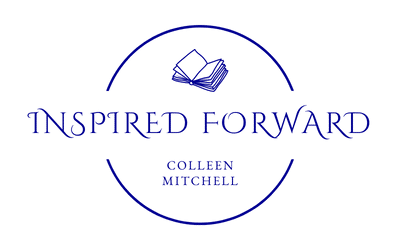Inspired Forward is an Amazon Affiliate partner.

If you’re familiar with Ruth Soukup’s podcast and book, Do It Scared, you might remember that she has her “Seven Principles of Courage.”
I took that list and incorporated them into my own principles to live by. I want to explain why each of these is important to me, and how practicing them yourself can lead to a healthier, happier life. You can read my review of Do It Scared here.
Since this turned into a really long post, I’ve split it into three parts. This is part 1. You can find part 2 here and part 3 here.
1. Always Be a Safety Champion.
Safety is a value, not a priority. As such, it’s the first on my list of principles. We should never risk safety for the sake of time, pride, or anything else less important than the basic need for food, water, and shelter. Always be a safety champion means that you keep an eye out for hazards. You make sure you and those you care about practice safety on a daily basis.
How it Works in My Life
As part of my company’s safety committee, I check our fire extinguishers on a monthly basis. This ingrained a habit to look at every extinguisher I pass now, whether on the job or not. I’m also a lot more aware of when others violate safe practices, such as jaywalking in front of my company’s building when there are two crosswalks just a couple hundred feet down the road (if that).
To me, “Always be a safety champion” is a daily reminder to slow down, recognize hazards, and think about if what I’m doing will negatively affect anyone, not just myself.
After all, the decisions we make don’t affect just us.
How it Can Work for You
Adopt this practice into your life by taking a moment to look at everything through fresh eyes. Pretend you’re a beginner. What and where are the hazards? Would you let your child, spouse, or best friend do what you’re about to do?
The answer should be your guide to your own behavior. If you wouldn’t let your kid jaywalk, why are you doing it?
Being safe can sometimes feel like it takes too much time. But if being unsafe carries the risk of costing you even more time (or your life), then isn’t it worth slowing down?
2. Practice Extreme Ownership.
Extreme ownership is the philosophy that you take responsibility for everything in your world, whether or not you’re actually responsible for it. You own your mistakes and failures as well as the mistakes and failures of those in your sphere of leadership. Jocko Willink and Leif Babin, former Seal Team commanders, wrote a book (Extreme Ownership) on this subject drawing lessons from their time in Ramadi during the Iraq War.

How it Works in My Life
I’m responsible for all my decisions. I can’t blame my parents, my sister, or other people for the decisions I’ve made. The only person in control of my life… is me. I can’t credit or blame my college experience for either having or not having a job. That’s all on me and my decisions.
Similarly, if someone close to me is struggling or failing, that’s on me too. I didn’t do enough to guide them on the right path or help them when they needed it. In the book, Jocko and Leif talk about how taking responsibility for the mistakes of your subordinates actually makes others think of you in a better light.
We don’t like it when others pass the buck and don’t take the blame. So why do we think we get a free pass to blame someone else when ultimately, it’s our responsibility?
How it Can Work for You
Take a hard look at your life and take note of all the areas in which you blame someone or something else for your current situation. Is your marriage a crumbling mess? That’s on you. Don’t blame your spouse—recognize your part in it, and then take full responsibility for fixing it.
3. There Are No Mistakes, Only Lessons
How many of us fear making mistakes? Fear that others will see our “failures” and think less of us? A mistake is “an action or judgment that is misguided or wrong.” By contrast, one of the definitions of “lesson” is “a thing learned by experience.” When we make “mistakes,” we’re experiencing something that is rich with learning—often learning what not to do again.
Think of this principle as one of “trial and error.” That’s the only way society progresses, right? We try things, they don’t work, and so we try something else. That’s the way of science, too. When we purposefully look for the lessons in our “mistakes” and “failures”, we are constructing a manual or guidebook on how to live our lives.
If we don’t learn from our mistakes, what’s the point in making them? Avoiding mistakes is a recipe for a hollow, bland existence.

How it Works in My Life
As “People Pleaser” is my top fear archetype, this one is difficult to embrace. But embrace it I must. I hate looking like I don’t know what I’m doing. But, the truth is that none of us really know what we’re doing. I’m an adult, but I don’t really know what that means other than being “independent” from my parents and having responsibilities like bills, doctor’s appointments, and booking my own travel—and paying for it.
I spent much of my childhood learning from my sister’s mistakes. How not to act. What not to say. Things not to do. I try to learn from others because making mistakes is so painful for me. But when I do make mistakes, the only way to handle them is to practice extreme ownership over the results and extract the lesson.
Why was it a mistake, and what can I do so that I don’t make that mistake again?
How it Can Work for You
Treating mistakes as lessons takes a big mindset shift. It’ll be difficult to be so blasé about it—even though it’s not really blasé at all. Some mistakes can be painful to learn from, but that’s part of the process.
Think about some of the mistakes you’ve made in life that you wish you could go back and change. Instead of focusing on beating yourself up, focus on what you learned from that experience that you can apply to your life going forward. Maybe it’s something you’ll never do again—or a way of phrasing something that isn’t attacking in nature.

Call to Action
These are the first three Principles to Live By! Which of these is the hardest for you to resonate with? Which is the easiest? Consider doing one thing per day for the next three days that embodies each of these principles. Point out an unsafe behavior or item to someone. Take personal responsibility and ownership for how you feel when you’re driving and someone cuts you off. Look for the lessons in everything you do—not just in your mistakes.
See you in part 2, with principles four through six!
[mailerlite_form form_id=7]
